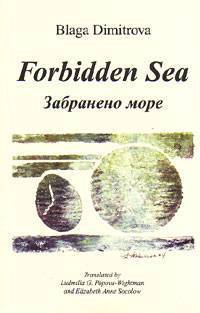
In John Updike’s short story “The Bulgarian Poetess” the narrator reports the following short dialogue with the eponymous Bulgarian Poetess:
“Your poems. Are they difficult?”
She smiled and, unaccustomed to speaking English, answered carefully, drawing a line in the air with two delicately pinched fingers holding an imaginary pen: “They are difficult—to write.”
He laughed, startled and charmed. “But not to read?”
She seemed puzzled by his laugh, but did not withdraw her smile, though its corners deepened in a defensive, feminine way. “I think,” she said, “not so very.”
Yes, the poems of Blaga Dimitrova, the inspiration for this short story, are not so very difficult to read. Her poetry is about universal human experiences from a female point of view: love, motherhood, death are important topics in her verses. Forbidden Sea for example was written in a time when the author had to face a long battle with cancer. Her close encounter with death brought life into sharp focus, awoke in her eternal questions about the meaning of human existence, the magnetism of love, the mysteries and vicissitudes of human fate. The sea is present not only like a magnificent view, but also like a spontaneous rhythm, like a myth, a symbol of life, love, infinity and freedom. Freedom was lacking in Bulgaria, a totalitarian dictatorship with an iron censorship, a country where not only the sea was “forbidden,” but also “words!”

As the introduction to one of her two available collections with poetry in English (Forbidden Sea, translated by Ludmilla G. Popova-Wightman and Elizabeth A. Socolow, Ivy Press Princeton 2000, and Scars, translated by Ludmilla G. Popova-Wightman, Ivy Press Princeton 2003) states correctly, her poems sublimate her conflicts in life she was facing as an independent and sometimes rebellious spirit in a dictatorship. Blaga Dimitrova, who was also an accomplished author of prose, has often been compared with some of the other great female poets of the 20th century: Anna Akhmatova, Marina Tsvetaeva, Gabriela Mistral, Wislawa Szymborska, Desanka Maksimovich and, above all her compatriots Elisaveta Bagryana and Dora Gabe.
Her poetry (samples can be found here and here), available in two volumes in excellent translation, is worth to be discovered!
This review was first published at Global Literature in Libraries Initiative, 11 June, 2018 for #BulgarianLiteratureMonth.
© Thomas Hübner and Mytwostotinki, 2014-8. Unauthorized use and/or duplication of this material without expressed and written permission from this blog’s author and/or owner is strictly prohibited. Excerpts and links may be used, provided that full and clear credit is given to Thomas Hübner and Mytwostotinki with appropriate and specific direction to the original content.



 Facebook
Facebook RSS
RSS Twitter
Twitter